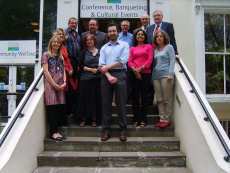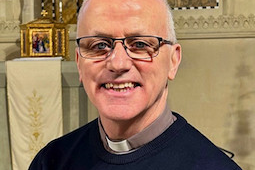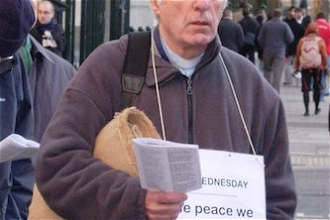The last acceptable prejudice: Travellers in Prison project launched

Participants at Travellers in Prison Project launch
The launch of the Travellers in Prison Project took place last Friday, at the Irish Chaplaincy in Britain (ICB) headquarters in Camden, North London. The project has been developed to investigate the situation of Irish Travellers in prisons in England and Wales. The launch was attended by the First Secretary to the Irish Embassy in Britain, representatives of the Traveller community, prison chaplains, a number of senior academics and other interested professionals who will steer the research project to successful completion.
The aim of the research is to improve the conditions of Irish Travellers in prison and their families by highlighting the specific hardships faced by this isolated section of society. The research findings will be published in a report due in Spring 2011.
Dr Tony Jeffs of the University of Durham and the University of Bedfordshire, and the chair of the project’s steering group, highlighted the "almost unbelievable lack of government statistics or research on Travellers in Prison. Irish Travellers in prison suffer unique privations and yet the government has failed to respond in any substantial way."
Dr Margaret Greenfields of Buckinghamshire New University, a leading researcher on issues affecting Traveller communities said: "This research will assist in clarifying the range of issues facing these particular prisoners... The findings … should help to ensure that Travellers in prison are treated in a culturally sensitive manner in line with other ethnic groups".
"Irish Travellers have their own customs, traditions, even language" said Conn Mac Gabhann, researcher on the Travellers in Prison Project ‘and yet very few prisons are successful in taking this diversity into account when dealing with them. It’s not a question of giving Travellers better conditions than other prisoners. It is more a case of respecting their different background in the same way as prisons accommodate a wide variety of ethnic and religious groups."
Startlingly, there are no official figures for the numbers of Travellers in prison even though the Government recognises Irish Travellers as a distinct ethnic group and recognises that in some respects Irish Travellers suffer more than any other group in prison. One member of the steering group, Father Joe Browne, a prison chaplain, puts this down to an attitude prevalent in society in general; he describes the suspicion and mistreatment of Travellers as ‘the last acceptable prejudice.’
Describing the need for research on the issue as ‘urgent,’ Father Gerry McFlynn said: "I work with large numbers of Irish Travellers in prison. They need suitable education programmes because without basic literacy skills, access to rehabilitation courses, healthcare, family or dealing with legal matters is nearly impossible. I would have to say prison is a more difficult place for Irish Travellers generally than for most others."
"In the 1990s with the introduction of the CJPOA (Criminal Justice and Public Order Act), the Government criminalised the Traveller way of life by effectively banning nomadism" said Philomena Cullen, the Director of the Irish Chaplaincy in Britain.
"This introduced a whole community into the criminal justice system. As a result of this, and a number of other associated factors, a high proportion of the Traveller community has been incarcerated."
Used to their own social conventions and way of life, prison has been especially traumatic for Travellers. There have been a very high number of suicides and cases of self-harm among Travellers, numerous reports of racist abuse and discrimination directed at Travellers in prison.
Prison should be an opportunity for society to protect itself by ensuring effective rehabilitation takes place. It is in nobody’s interest that rehabilitation is jeopardised or that Travellers suffer an unusually harsh experience in prison. Leaving prison in a worse state physically and mentally, and with no educational progress, only leads to increased levels of re-offending.
The current inadequacies in the criminal justice system in respect of Irish Travellers are noted by the vast majority of professionals in the system. It is hoped that the Irish Chaplaincy’s research will begin to address this large gap in knowledge and provision for Travellers in Prison.
The Travellers in Prison Project will make a substantial contribution to the discussion on the most effective ways of working with Irish Travellers within the prison system by identifying the issues which have blighted their chances of rehabilitation.
Tony McCullagh, First Secretary to the Irish Embassy in London, says that the project ‘"ll help identify specific problems faced by Irish Travellers while in prison and hopefully enable measures to be put in place to overcome these difficulties."
Source: Irish Chaplaincy





















